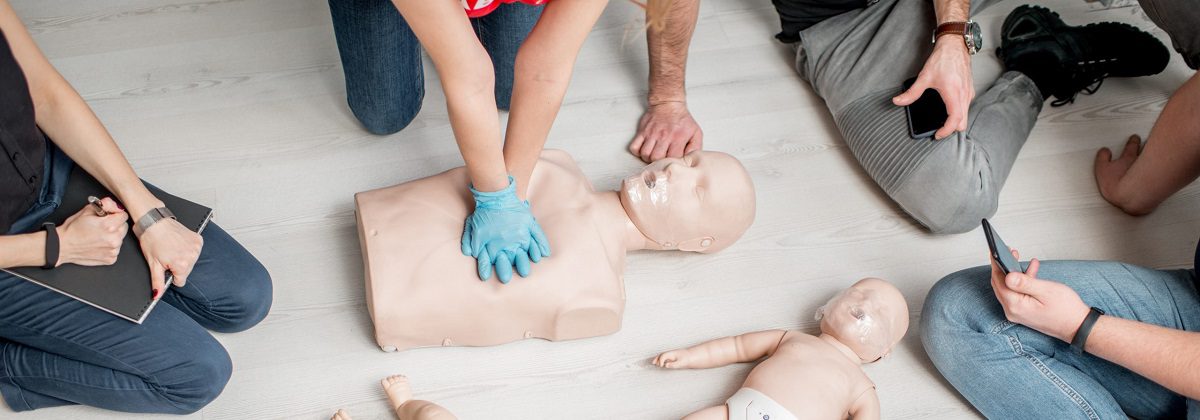Background
The Safety, Health and Welfare at Work (General Application) Regulations 2007: Part 7 – Chapter 2: Regulation 165(1)(b) requires employers to:
- Provide and maintain suitably marked and easily accessible first-aid equipment, as is adequate and appropriate in the circumstances for enabling first-aid to be given to persons at every place where working conditions require it, at a place of work under the employer’s control.
- Designate at each place of work under the employer’s control the number of first-aiders as is necessary to give first-aid at the place of work.
- Ensure that the number of first-aiders, their training and the equipment available to them is adequate, taking account of the size or hazards, or both, of each such place of work.
- Ensure that details of arrangements made for the provision of first-aid, including the names of first-aiders and the location of first-aid rooms, equipment and facilities for or at the place of work are included in the safety statement, and the names, addresses and telephone numbers of the local emergency services are clearly displayed at each place of work.
Further guidance and frequently asked questions can be found at this link.
Role and responsibility of a First Aid Responder
A First Aid Responder may be a healthcare practitioner, or a member of the public who has undertaken a First Aid Response course incorporating the Cardiac First Response (CFR) standard. In addition to CFR skills, the First Aid Responder possesses defined skills in the further management of a patient who has become suddenly ill or injured in the pre-hospital environment until the arrival of emergency medical services (EMS). The First Aid Responder is able to assess and manage these patients in accordance with PHECC Clinical Practice Guidelines (CPGs). The First Aid Response Standard adopts a uniform approach to interacting with patients and other emergency medical services in the pre-hospital setting. Finally, First Aid Responders must be able to demonstrate a commitment to the process of continuous responder competence and will be required to maintain their skill levels in First Aid Response including CFR at defined intervals.
First Aid Response Standard Rationale
The First Aid Responder will possess the following general skills. The ability to:
- deal with life threatening or potentially life-threatening conditions in the pre-hospital environment until arrival of emergency medical services
- provide First Aid Response for conditions not thought to be life-threatening but are necessary to prevent further harm before the emergency medical services arrive
- provide pre-hospital First Aid Response in a wide range of environments including home, recreational and workplace settings
- display the requisite personal skills including composure, competence and self-confidence while understanding their limitations.
Learning outcomes
There are competencies that students who achieve the First Aid Response Standard are required to demonstrate. Upon completion of a recognised First Aid Response course the student will be able to:
- Recognise and Assess the causes and effects of sudden illness and/or injury in a pre-hospital environment and call for emergency medical services.
- React to such pre-hospital emergencies utilising PHECC CPGs.
- Respond in a safe, effective, and appropriate manner to such emergencies utilising the First Aid Response skill set and in accordance with PHECC CPGs as part of the pre-hospital continuum of care.
- Record and Report actions and interventions taken while responding to and managing such incidents and during handover to emergency medical services.
- Retain a caring attitude in their role as First Aid Responders.
The learning objectives in the Standard refer to the management of adults and children unless stated otherwise.
The First Aid Response (FAR) standard incorporates the CFR Community standard:
If course participants are holders of CFR Community certificates, recognition of prior learning may be applied. However, as the retention of CFR skills is known to diminish after time, it is recommended that such students participate fully in the CFR component of the course. If students are CFR Advanced certified, they must attend a separate CFR Advanced course to recertify at that level.
Entry Criteria:
There is no specific entry criterion including a minimum age for undertaking the course. However, a course participant should be mature enough to comprehend the knowledge, skills and implications associated with defibrillation and have a maturity to complete assessment to receive certification.
The Cpl Institute currently only provide PHECC FAR training to persons over the age of 18.
Duration:
The duration of a First Aid Response course incorporating the CFR Community standard and assessment is no less than 18 contact hours (excluding breaks – averaging 6 hours instruction per day).
Ratio:
The instructor student ratio shall not exceed 1:8 for practical skills sessions.
Assessment:
Course participants have their skills formally assessed throughout and at the end of the course. Skill assessment sheets are completed for each learner. The mandatory components are:
- Assessment using the PHECC’s CFR Community skill assessment sheet and the First Aid Response skills assessment sheets.
- A 30-minute, 20 question MCQ written exam; the pass mark is 60%.
Remediation:
Should learners have difficulty reaching the PHECC FAR standard they will be supported with remediation efforts.
Certification:
First Aid Response Certificate – PHECC Accredited
Refresh your First Aid Training Course qualification:
If you are a qualified PHECC First Aider then you need to recertify within the 2 year period as per PHECC guidelines.
Check out our First Aid Refresher dates at this link
